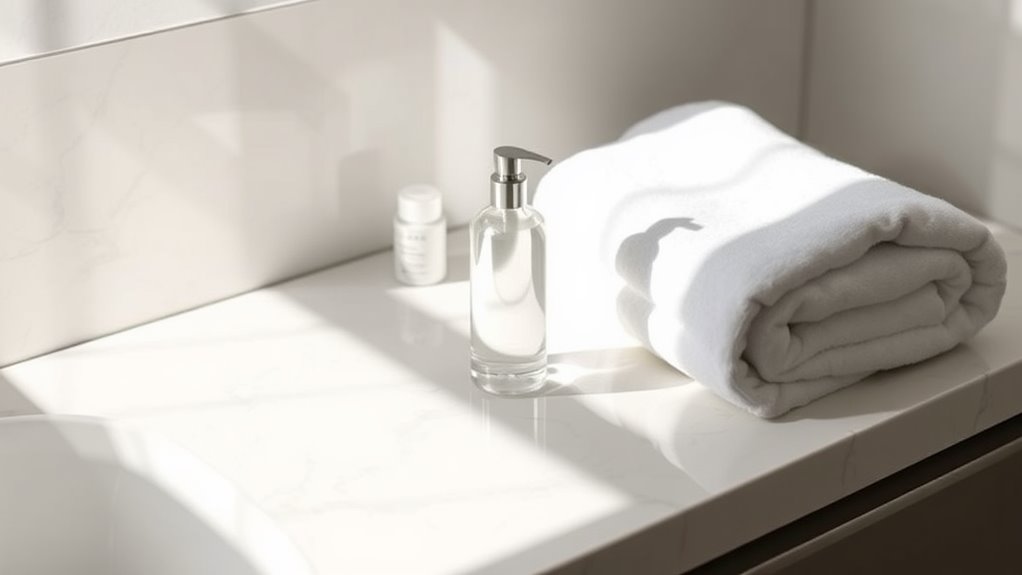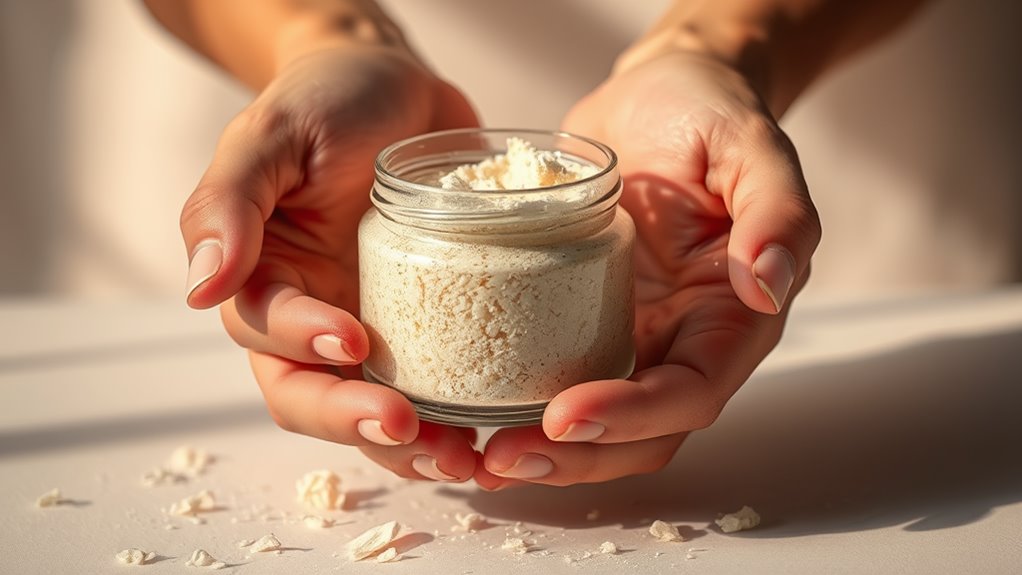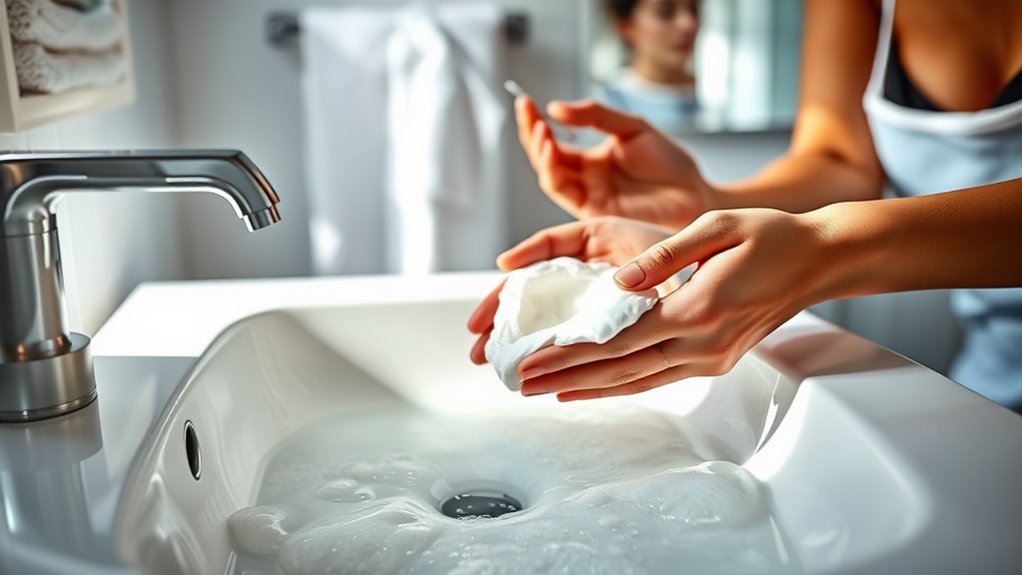Your Skincare Might Be Too Complicated – Try This Simplified Version
Your skincare routine might be overcomplicated, but simplifying it can lead to better results. Start by identifying your skin type to tailor cleansing and moisturizing accordingly. Use a gentle cleanser, choose the right moisturizer with key hydrating ingredients, and don’t skip sunscreen daily. Exfoliate 1 to 3 times a week based on skin needs. Stay hydrated and maintain a simple evening routine to help your skin repair overnight. Discover more tips to enhance your routine effectively.
Key Takeaways
- Identify your skin type to customize a simplified skincare routine that meets your specific needs.
- Focus on essential steps: cleanse, moisturize, and apply sunscreen daily for effective skin care.
- Choose a single, multi-tasking moisturizer with hydrating ingredients like hyaluronic acid or ceramides.
- Limit exfoliation to 1-3 times per week using either physical or chemical exfoliants based on your skin type.
- Streamline your evening routine: cleanse, tone, apply serum, and moisturize to support overnight skin repair.
Understanding Your Skin Type
How well do you know your skin? Understanding your skin type is crucial for establishing a simple skincare routine that works for you.
Skin types generally fall into four categories: oily, dry, combination, and sensitive. To identify yours, observe how your skin reacts throughout the day. If it feels greasy, you likely have oily skin. If it’s tight or flaky, you may be dealing with dryness. Combination skin shows characteristics of both, and sensitive skin often reacts to products or environmental factors. People with combination skin may notice oiliness in the T-zone while experiencing dryness on the cheeks.
Once you determine your type, tailor your routine accordingly. Use lightweight products for oily skin, rich moisturizers for dry skin, and gentle formulations for sensitive skin.
This knowledge empowers you to achieve optimal results with minimal effort.
The Importance of Cleansing
Cleansing your skin is essential for removing impurities and preventing breakouts. It also prepares your skin for treatments, ensuring they work more effectively. Additionally, avoiding common cleansing mistakes can enhance your skincare routine and improve overall skin health.
Removing Impurities Effectively
Though it may seem simple, removing impurities from your skin is crucial for maintaining a healthy complexion. A proper cleanse clears away dirt, oil, and pollutants, which can clog pores and lead to breakouts.
To effectively remove impurities, consider these key steps:
- Choose a cleanser suited for your skin type.
- Use lukewarm water to open pores and enhance product efficacy.
- Massage the cleanser gently for at least 30 seconds.
- Rinse thoroughly to ensure no residue remains.
Adopting this routine helps maintain your skin’s balance, prevents irritation, and prepares your skin for any subsequent treatments.
Preparing Skin for Treatment
A thorough cleanse is essential before applying any skincare treatment. Cleansing removes dirt, oil, and impurities that can hinder product absorption and effectiveness.
You want your skin to be a clean canvas, allowing active ingredients to penetrate deeply and work their magic. Choose a gentle cleanser that suits your skin type—gel for oily skin, cream for dry.
Use lukewarm water to avoid stripping natural oils, and don’t rush the process; spend at least 30 seconds massaging the cleanser into your skin.
Rinse thoroughly to ensure no residue remains.
Choosing the Right Moisturizer
How do you know which moisturizer is right for your skin? Selecting the ideal moisturizer can transform your skincare routine.
Focus on your skin type and specific needs. Here are key factors to consider:
-
Skin Type: Oily, dry, combination, or sensitive.
-
Ingredients: Look for hyaluronic acid for hydration or ceramides for barrier support.
-
Texture: Choose a lightweight gel for oily skin or a rich cream for dry skin.
-
Fragrance-Free: Opt for products without added fragrances to minimize irritation.
Additionally, understanding your skin type can help you choose the best cleanser that complements your moisturizer and overall routine.
Incorporating Sunscreen Daily
Daily sunscreen application is essential for protecting your skin from harmful UV rays. Even on cloudy days or when you’re indoors, UV rays can penetrate windows and damage your skin.
Choose a broad-spectrum sunscreen with at least SPF 30 and apply it every morning, regardless of the weather. Make it a non-negotiable part of your routine, just like brushing your teeth. It’s crucial to remember that sunscreen is your skin’s best defense against premature aging and skin cancer.
Don’t forget to reapply every two hours, especially if you’re sweating or spending time in water. You can simplify your routine by selecting a moisturizer that includes sunscreen, ensuring you never skip this critical step.
Simplifying Exfoliation
Exfoliation is key to maintaining healthy skin, but choosing the right type can be confusing.
You’ve got two main options: physical exfoliants, which scrub away dead skin, and chemical exfoliants, which dissolve debris at a cellular level. Regular exfoliation helps to prevent rough and uneven skin texture, allowing you to achieve a smooth, radiant complexion without overdoing it. Knowing how often to use each type will help you achieve a smooth, radiant complexion without overdoing it.
Types of Exfoliants
Understanding the different types of exfoliants can help you choose the right one for your skin’s needs. Exfoliants primarily fall into two categories: physical and chemical.
-
Physical Exfoliants: Use small particles or tools to manually buff away dead skin cells.
-
Chemical Exfoliants: Contain acids or enzymes that dissolve dead skin without scrubbing.
-
AHAs (Alpha Hydroxy Acids): Water-soluble acids, great for dry skin, improving texture and hydration.
-
BHAs (Beta Hydroxy Acids): Oil-soluble, ideal for oily and acne-prone skin, penetrating pores to clear congestion.
Selecting the right exfoliant enhances your routine and addresses specific skin concerns effectively.
Frequency of Use
Finding the right exfoliation frequency is crucial for maintaining healthy skin without causing irritation. Most experts recommend exfoliating 1 to 3 times per week, depending on your skin type and the exfoliant used.
If you have sensitive skin, stick to once a week with a gentle exfoliant. For oily or acne-prone skin, you might benefit from more frequent exfoliation, but listen to your skin. Over-exfoliating can lead to redness, dryness, and breakouts.
Always follow exfoliation with a hydrating serum or moisturizer to replenish your skin’s barrier. Monitor your skin’s response and adjust accordingly; mastery comes with understanding your unique needs.
Consistency is key, but so is being responsive to what works for you.
The Role of Serums in Skincare
While you might already have a solid skincare routine, incorporating serums can elevate your regimen significantly.
Serums are concentrated formulations that deliver active ingredients deep into your skin, providing targeted solutions for various concerns. They’re typically lightweight and absorb quickly, making them an essential addition to your routine.
Here are a few key benefits of using serums:
- Targeted Treatment: Address specific skin issues like aging or hyperpigmentation.
- High Concentration: Contain potent ingredients in smaller volumes for maximum efficacy.
- Enhanced Hydration: Provide an extra layer of moisture, improving overall skin texture.
- Layering Flexibility: Easily integrate with other products without feeling heavy.
Incorporating serums can transform your skincare game, helping you achieve your desired results faster.
Essential Ingredients to Look For
When it comes to skincare, knowing which ingredients to prioritize can make a big difference in your routine.
Look for key hydrating ingredients to maintain moisture, powerful antioxidants to protect your skin, and essential oils to achieve balance.
These components can help you achieve a healthier, more radiant complexion.
Key Hydrating Ingredients
To achieve optimal hydration for your skin, it’s essential to recognize key ingredients that deliver moisture effectively.
Incorporating these elements into your skincare routine can transform your skin’s texture and appearance.
-
Hyaluronic Acid: Attracts and retains water, providing intense hydration.
-
Glycerin: A humectant that draws moisture from the air into your skin, keeping it plump.
-
Squalane: Mimics skin’s natural oils, offering lasting moisture without clogging pores.
-
Ceramides: Strengthen the skin barrier, preventing moisture loss and enhancing hydration.
Powerful Antioxidants Benefits
Antioxidants play a crucial role in protecting your skin from environmental damage, so incorporating them into your skincare routine can significantly enhance your complexion.
Look for powerful ingredients like Vitamin C, which brightens skin and reduces dark spots, or Vitamin E, known for its moisturizing and healing properties. Green tea extract is another excellent option; it combats inflammation and soothes irritated skin.
Resveratrol, found in grapes, offers anti-aging benefits by neutralizing free radicals. Additionally, ferulic acid boosts the effectiveness of other antioxidants, making your routine even more potent.
By choosing products rich in these essential antioxidants, you’ll not only shield your skin from damage but also promote a radiant, youthful appearance.
Prioritize these ingredients for maximum skincare benefits.
Essential Oils for Balance
Incorporating essential oils into your skincare routine can provide a natural way to achieve balance and harmony for your skin.
These potent extracts can enhance your regimen by targeting various skin concerns while promoting overall well-being.
Here are four essential oils to consider:
-
Lavender: Soothes irritation and promotes relaxation.
-
Tea Tree: Fights acne-causing bacteria and reduces inflammation.
-
Frankincense: Improves skin tone and reduces the appearance of scars.
-
Geranium: Balances oil production and enhances circulation.
The Power of Hydration
While many factors contribute to healthy skin, hydration stands out as one of the most crucial. Maintaining optimal moisture levels keeps your skin plump, radiant, and resilient. Dehydrated skin can lead to fine lines, irritation, and an uneven tone.
To enhance hydration, incorporate a quality moisturizer tailored to your skin type, ideally one that includes hyaluronic acid or glycerin, which attract moisture. Don’t overlook the importance of drinking adequate water daily; it fuels your skin from within.
Additionally, consider using a humidifier in dry environments to lock in moisture. Remember, hydration isn’t just about topical products; it’s a holistic approach.
Evening Routine Made Easy
To maintain that healthy glow you achieved through hydration, an effective evening routine is key.
Simplifying your evening regimen helps your skin reset overnight. Here’s what you need:
-
Cleanser: Remove dirt and impurities without stripping your skin.
-
Toner: Balance your skin’s pH and prep it for further treatment.
-
Serum: Target specific concerns like fine lines or dark spots with potent ingredients.
-
Moisturizer: Lock in hydration and create a barrier for repair.
Tips for Maintaining Consistency
Sticking to a skincare routine can feel overwhelming, but it doesn’t have to be. To maintain consistency, simplify your regimen. Choose a few effective products and stick with them.
Set a specific time each day for your routine—making it part of your daily ritual helps reinforce the habit. Use reminders on your phone or place your products in a visible location to prompt you.
Track your progress in a journal; noting improvements can motivate you to stay committed. Lastly, remember that building consistency takes time. Be patient with yourself, and don’t get discouraged by occasional slip-ups.
Embrace the journey and focus on the long-term benefits for your skin. Consistency is key to mastering your skincare routine.




